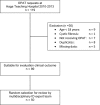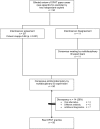The impact of an infectious disease expert team on outpatient parenteral antimicrobial treatment in the Netherlands
- PMID: 30478489
- PMCID: PMC6394504
- DOI: 10.1007/s11096-018-0751-4
The impact of an infectious disease expert team on outpatient parenteral antimicrobial treatment in the Netherlands
Abstract
Background There is increasing interest in outpatient parenteral antimicrobial treatment. Objective To evaluate the added value of consultation of an infectious diseases expert team (consisting of two internist-infectious diseases specialists and a microbiologist) for advice regarding type, administration route and duration of antibiotic treatment. Setting A retrospective case series was performed at the Haga Teaching Hospital, a 700-bed regional teaching hospital in The Hague, The Netherlands. Methods Complication rate and mortality was evaluated during 60 days of follow-up. Therapeutic rationality regarding outpatient parenteral antimicrobial treatment was determined by presenting randomly selected paper cases from the database to two independent infectious diseases specialists who were blinded to patient's treatment and outcomes. The concordance between the two advices were analysed using Cohen's kappa. For those with discordance, an infectious diseases expert team meeting was organized to reach consensus. The final recommendation was compared to the actual given antibiotic treatment. Main outcome measure Discrepancy between the infectious disease expert team recommendations upon type, administration route and duration of antibiotics and the real outpatient parenteral antimicrobial treatment practice. Results Out of 89 included cases, 50 were randomly selected for review by the infectious diseases specialists. The kappa statistic regarding antimicrobial policy was 0.581 (P < 0.001). In 78% (39/50 cases), they had complete agreement upon all aspects of antibiotic treatment. The remaining 11 cases were reviewed by the expert team. Comparing the consensus of 50 cases to actual practice, in 14(28%) cases there was a discrepancy suggesting potential room for improvement. Comparing the cases in whom an individual infectious diseases specialist was involved in real practice to those cases without, there was 18% versus 42% discrepancy with the recommendations of the expert team (OR 3.4; 95% CI: 0.9-12.5, P = 0.06). Complication rate was 19% including unplanned readmissions and side effects of antimicrobial agent or administration route. Conclusion Though outpatient parenteral antimicrobial treatment policies in the Netherlands appear to be safe, consultation of an ID expert team, rather than an individual ID specialist, has the potential to optimize antimicrobial treatment in patients considered suitable for outpatient parenteral antimicrobial treatment.
Keywords: Antimicrobial stewardship; Expert Consultation; Home treatment; Infectious diseases; OPAT; Outpatients; The Netherlands.
Conflict of interest statement
Conflicts of interest
All authors declare that they have no conflict of interest.
Data availability
The datasets generated and/or analysed during the current study are available from the corresponding author on reasonable request.
Figures
Similar articles
-
Mandatory infectious diseases approval of outpatient parenteral antimicrobial therapy (OPAT): clinical and economic outcomes of averted cases.J Antimicrob Chemother. 2014 Jun;69(6):1695-700. doi: 10.1093/jac/dku015. Epub 2014 Feb 13. J Antimicrob Chemother. 2014. PMID: 24532684
-
Infectious Diseases Specialty Intervention Is Associated With Better Outcomes Among Privately Insured Individuals Receiving Outpatient Parenteral Antimicrobial Therapy.Clin Infect Dis. 2019 Mar 19;68(7):1160-1165. doi: 10.1093/cid/ciy674. Clin Infect Dis. 2019. PMID: 30247512
-
Antimicrobial stewardship in the outpatient parenteral antimicrobial therapy (OPAT) setting: the impact of prescription assessment by an infectious diseases specialist.Braz J Infect Dis. 2021 Mar-Apr;25(2):101560. doi: 10.1016/j.bjid.2021.101560. Epub 2021 Mar 11. Braz J Infect Dis. 2021. PMID: 33716018 Free PMC article.
-
Outpatient parenteral antimicrobial therapy and antimicrobial stewardship: challenges and checklists.J Antimicrob Chemother. 2015 Apr;70(4):965-70. doi: 10.1093/jac/dku517. Epub 2014 Dec 23. J Antimicrob Chemother. 2015. PMID: 25538169 Review.
-
Outpatient parenteral antimicrobial therapy and antibiotic stewardship: opponents or teammates?Infection. 2019 Apr;47(2):169-181. doi: 10.1007/s15010-018-1250-1. Epub 2018 Nov 15. Infection. 2019. PMID: 30443780 Review.
Cited by
-
The Value of Ortho-ID Teams in Treating Bone and Joint Infections.J Bone Jt Infect. 2019 Nov 20;4(6):295-299. doi: 10.7150/jbji.41663. eCollection 2019. J Bone Jt Infect. 2019. PMID: 31966961 Free PMC article. No abstract available.
-
Successful Integration of Clinical Pharmacists in an OPAT Program: A Real-Life Multidisciplinary Circuit.Antibiotics (Basel). 2022 Aug 19;11(8):1124. doi: 10.3390/antibiotics11081124. Antibiotics (Basel). 2022. PMID: 36009993 Free PMC article. Review.
-
Risk factors for readmission among patients receiving outpatient parenteral antimicrobial therapy: a retrospective cohort study.Int J Clin Pharm. 2022 Apr;44(2):557-563. doi: 10.1007/s11096-022-01379-7. Epub 2022 Feb 14. Int J Clin Pharm. 2022. PMID: 35157228 Free PMC article.
-
Implementing the First Outpatient Parenteral Antimicrobial Therapy (OPAT) Program to Utilize Disposable Elastomeric Pumps in the Gulf Region: Results From a Tertiary Teaching Hospital in the Kingdom of Saudi Arabia.Cureus. 2021 Dec 5;13(12):e20179. doi: 10.7759/cureus.20179. eCollection 2021 Dec. Cureus. 2021. PMID: 34900504 Free PMC article.
-
Ceftriaxone for the Treatment of Chronic Bacterial Prostatitis: A Case Series and Literature Review.Antibiotics (Basel). 2022 Jan 11;11(1):83. doi: 10.3390/antibiotics11010083. Antibiotics (Basel). 2022. PMID: 35052960 Free PMC article.
References
-
- Rucker RW, Harrison GM. Outpatient intravenous medications in the management of cystic fibrosis. Pediatrics. 1974;54(3):358–360. - PubMed
MeSH terms
Substances
LinkOut - more resources
Full Text Sources
Medical



